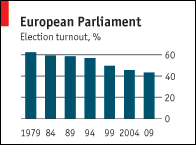Many of Europe’s voters do not like the European Union. Most of the rest don’t care. They should

IT WAS formally one election to a single body, the European Parliament. Yet in truth what took place between June 4th and June 7th were 27 separate polls, as both campaigners and voters focused mainly on national issues, not European ones. The dream of a European demos nourishing a pan-European democracy based on Europe-wide parties is more distant than ever. Even so, voters from Nuorgam in northern Finland to Tarifa in southern Spain seemed to share some ideas—and they are not reassuring for the European Union.
The first was indifference. The average EU-wide turnout was 43%, the lowest since the first direct elections to the European Parliament in 1979. The pattern is not universal: turnout actually rose in seven countries, and it was lower in eastern than in western Europe. But almost everywhere turnout was far below levels in national elections. Thirty years on, that should worry not only new MEPs in Strasbourg, but also the leaders in Brussels and national capitals who steer the EU.
A second common element was a harsh judgment on the mainstream left. Most governments of the left suffered heavy defeats (as in Britain, Hungary, Portugal and Spain). But the left did badly even where it is in opposition (France and Italy) or in coalition with the mainstream right (Germany, the Netherlands and Austria). The umbrella Socialist group in the European Parliament lost as many as a quarter of its seats, leaving the mainstream centre-right group, the European People’s Party, more dominant than before, despite the imminent departure of British Conservatives who plan to form a new anti-federalist centre-right group (see article).
At first blush the woes of the mainstream left are surprising. Most of the EU is in deep recession, unemployment is rising and talk is of a crisis of capitalism—fertile ground for centre-left parties that favour higher taxes and more regulated markets. Yet the left’s appeal is waning. One reason is a string of unimpressive leaders who have offered little to take the place of globalisation. But it also reflects the ability of some on the centre-right, especially Germany’s Angela Merkel and France’s Nicolas Sarkozy, to steal the left’s clothes, with policies such as a bigger state and tougher regulation, and to persuade voters that the economic crisis came from abroad. Voters in Britain, Spain and Ireland, who saw their governments as responsible for their economic problems, punished them.
The worrying antis
The third feature of the elections was a sour and negative mood, shown not merely in a low turnout but also in wide support for a ragbag of far-right, populist, anti-EU or plain nutty parties. These ranged from the eccentric United Kingdom Independence Party and Geert Wilders’s Freedom Party in the Netherlands, which both came second in their national polls, to Hungary’s anti-gypsy Jobbik party and the Pirate Party in Sweden. Some of this was protest voting. But a chunk reflects views deeply antithetical to all that the EU stands for.
Why should it matter if mavericks give the EU a good kicking from time to time? True, the parliament has powers over EU legislation that will be further increased if the Lisbon treaty is ratified, but for the most part its loonier fringes can be safely ignored by their saner colleagues. Brussels has got around such trifles as negative opinion polls and even lost referendums: witness the unwanted EU constitution, now cross-dressed as the somewhat-less-awful Lisbon treaty. Indeed, from a liberal point of view, the freshly kicked Eurocrats might be less inclined to impose yet more unwanted bureaucracy on a continent already mired in red tape.
But once you look at some of the things that the kickers want to introduce, the picture is less reassuring. Protectionism and nationalism threaten the foundations of free-market economics. The single market is already under attack from several governments, as is the notion of admitting Turkey to the club. Attacks on immigration and minorities slide too easily into xenophobia, racism and homophobia. Extremist parties across Europe must be resisted because they are a danger not just to the EU but to basic civil liberties.
And is it so helpful to smash the institutions of the EU? Bodies such as the European Commission and the European Central Bank do not have the longevity or legitimacy that attach to their national counterparts. Yet some parts of the commission have been the doughtiest fighters for both free trade and enlargement. The ECB is one of Europe’s successes: as our special report in this issue argues, the euro has proved a haven in the economic crisis—so much so that no country seriously wants to leave it and plenty want to join. But the ECB was recently attacked by Mrs Merkel, supposedly the guardian of its independence. If European institutions operate without firm political support, it is fanciful to hope that they will remain strong enough to take sometimes unpopular decisions. And many of the causes that may suffer will be liberal ones.
It is not hard to see why so many Europeans chose to boycott these elections. But they may come to regret that choice.
